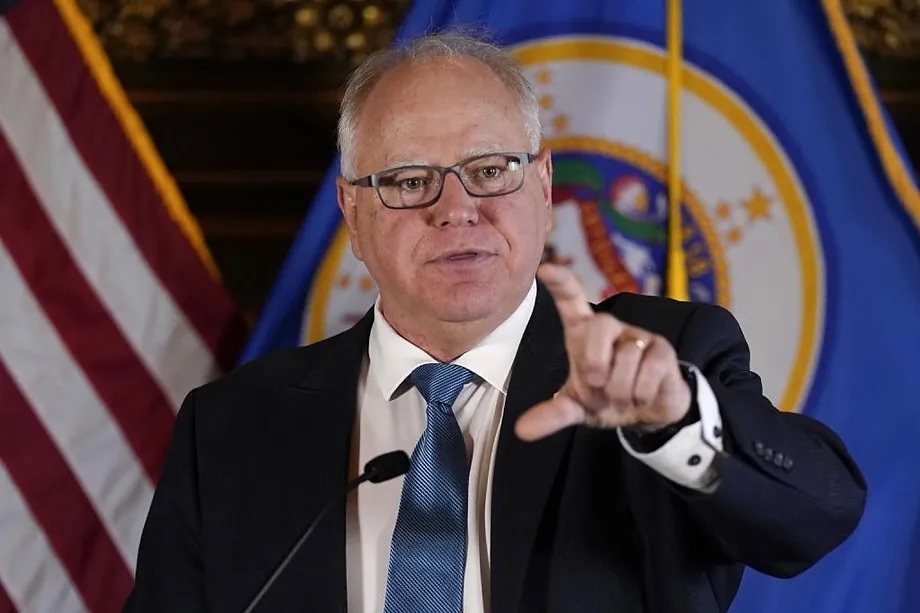If the stereotype that "Americans vote for the person they would like to have a beer with as president" can be applied to the vice president, Kamala Harris has made the right choice for her number two in the White House bid.
Tim Walz is the definition of a normal guy, who balances, both ideologically and personally, the profile of the Democratic candidate. He is from the region known as the Midwest, just like his Republican rival, J.D. Vance, but he represents much better the image of that part of the US of calm, hardworking people, and embodies common sense.
To see if that vision of the Midwest is still valid, or if, on the contrary, what prevails is the frustration, social crisis, and xenophobia of Vance, we will have to wait until November to find out. But the difference is obvious. Vance is like Elon Musk - someone with a sharp tongue ready to use it for sarcasm -; Walz, like Warren Buffett, the fifth richest man in the world, from Nebraska, who usually speaks like a man of the street, always with common sense, but who is capable of crushing his rivals and, above all, of earning billions of dollars. Walz's discretion has also played an important role in being chosen because it is clear that with his personality, he will not steal the spotlight from his boss.
It won't all be a bed of roses for Walz. The biggest racial riots in the last half-century in the US began in Minnesota in 2020, with the murder of African American George Floyd by white police officer Derek Chauvin. The governor was alternately accused of not doing enough to stop police violence or of not acting in time to stop the looting and protests, which spread across the country and caused dozens of deaths. Minnesota was also the state where one of the largest frauds in Covid-19 aid occurred.
Harris supported the protests, while Walz, who was in charge, had to juggle. Their different attitudes are also a result of their vastly different life paths. The vice president is multicultural, multiracial, urban, married, divorced, and even a famous - and controversial - ex-girlfriend of the then mayor of San Francisco, Willie Brown, 31 years her senior. And her ideology is ever-changing.
Walz is the complete opposite. If Harris was born in Berkeley - alongside the university of the same name where she studied, among others, Rodrigo Rato - her candidate to replace her as vice president was born in West Point, a town of 3,500 inhabitants in northeastern Nebraska, near Iowa, in the middle of the prairie, a conservative, agricultural, and traditional region that could be compared to Tierra de Campos, only replacing wheat with corn. Harris's family was multiethnic - a black immigrant father from Jamaica, an immigrant mother from India - intellectual - he had a Ph.D. in Economics; she in Endocrinology - and even multicultural - Anglican and Hindu altar boy, respectively. Walz's mother was a homemaker; his father, a high school principal. Both descended from German immigrants and were Lutheran Protestants.
Just that background marks a more than considerable temperament difference, which then continues throughout the lives of Harris and Walz. In his 60 years of life - he was born the same year as Harris but looks older than he is - the vice presidential candidate has been a high school teacher, American football coach, served in the National Guard for 28 years, and in the House of Representatives for 12, representing a rural agricultural district in southern Minnesota, near Nebraska.
All of this theoretically qualifies him as the perfect counterbalance to Harris to strengthen the Democratic vote in the Rust Belt states - Wisconsin, Michigan, and Pennsylvania - without which that party seems destined to lose the race to the White House. The governor of Minnesota is also known for owning firearms and hunting, making him more appealing to the rural and lower-middle-class and lower-class white vote, who prefer Donald Trump or Joe Biden over the very urban Harris. Minnesota is also largely a rural state, which can help Democrats gain votes in rural areas, which are predominantly Republican. Finally, the television market in the western half of Wisconsin is within Minnesota's market, making the new candidate well-known in that state, where Harris and Trump are tied and which will be one of the deciding states for the presidency.
Throughout his career, Walz has been shifting to the left, which is useful for Harris to mend her relationships with that sector of the Democratic Party that prefers Biden. When he entered politics, he had the support of the National Rifle Association, the gun lobby in the US. As governor of Minnesota, he has enacted laws that have tightened gun control in his state, considered abortion "a fundamental right" in Minnesota - crucial for the Democratic vote - and has advocated for undocumented immigrants to be able to obtain driver's licenses, which in the US is practically equivalent to giving them an ID, as the country does not have a national identification card, and that document usually serves that purpose.
